NEED A CATERER OR FOOD TRUCK? SUBMIT A CATERING REQUEST
- Home
- Food Trucks
- 8 Things To Know Before Opening A Food Truck
8 Things You Must KNOW Before OPENING A Food Truck
Food trucks are becoming increasingly popular in cities across Canada and the United States. They're mobile restaurants that serve fresh, delicious meals on wheels. But there are many things you need to consider before starting your own food truck. I will tell you 8 things you should know before launching a food truck business.
I personally have over 10 years experience in the food truck business and am going to list the things I have found to be the most important areas to know and understand before staring a food truck business. Just a warning I am going to be VERY honest about what is required below and it may turn you away from the business
#1 UNDERSTAND THAT FOOD TRUCKS ARE HARD WORK
From my experience this is probably the biggest source of failure for food truck businesses. People do not understand the huge amount of work and cost that it takes to keep a food truck operating. Food truck owners often work long hours and with things like food truck, getting stock, maintenance, cleaning, inspections, food prep and so on can use up the extra time between job and sometimes your days off. This is without dealing with bookings, staff, accounting, social media and whatever else that comes up.
Due to the hard work and time commitments mentioned above, food truck businesses often fail due to people not being able to sustain the work load. I don't want to come across rude here but I have seen over the years a lot of older people open a food truck as a “retirement” hobby. I do not recommend it, 99% of the food truck businesses that I have seen open with this age group don't even last a year. But to each their own and if you think you can do it and can handle a financial loss if it comes to that. Give it your best shot! But please talk to a local food truck venders or restaurant owners and you will probably be told the same thing.
#2 FIND 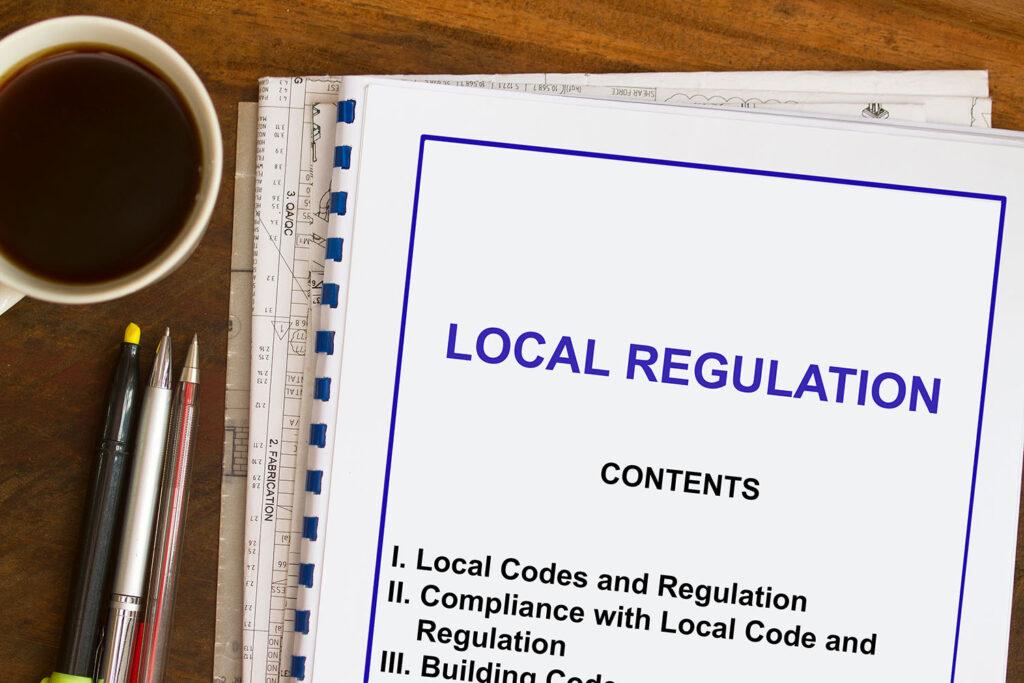 OUT YOUR LOCAL REGULATIONS
OUT YOUR LOCAL REGULATIONS
Understand the local laws and requirements BEFORE buying, building or opening a food truck business. The laws and requirements very greatly from country to country, state/province and even from city to city.
When I first started my food truck business in Vancouver, British Columbia there was very little information on the regulations. To be honest a lot of it was a big guessing game as to what was required from me in terms of food truck build, legal requirements and local rules, I had to learn as I went. Now it's pretty easy as most cities have regulations in place and the city staff for the most part are used to dealing with food trucks. This will make your life much easier. Well at least in terms of knowing what to do. If you're from a region such as Vancouver, you need MANY different things before you can open.
Some of the food truck requirements in Vancouver to just open your doors are as follows.
- You truck needs to be inspected once built by the city and/or blue prints given for approval. This is has not been required of me but I have heard Vancouver and some other cities may ask for this.
- Your electrical needs a decal from the local inspection agency to ensure it's to code
- Propane system needs to be inspected and approved, again to code which changes regularly
- Most trucks that deal with any kind of grease, need a hood system and fire suppression system, as well as two different types of fire extinguishers, 1 K Rated and 1 ABC.
- Hood system and fire suppression systems need to be inspected and cleaned every 6 months minimum by approved service providers, gone are the days you can clean your own hood system.
- Generators over 3000watts can be required to get a separate permit even if CSA approved.
- You need a health permit from the region the truck is based out of. You will also need to take a food safety course, which you need to now renew every 3 years.
- Some regions require a commissary kitchen to prepare/store your food in when your trucks not operating. This can cost as much as $1500 a month.
- All equipment must meet CSA standards (Canada) and if you have to replace any equipment that is run on propane, you need a professional to do it and a permit will need to be pulled at a cost calculated by the BTU's of the unit.
- Any truck over 5000Kg will need to take an online course and receive a NSA number, National Safety Code. Which is very complicated and impacts your ability to get vehicle insurance. This to me need to be revamped as the course covers logging vehicles, long haul truckers… 90% of the course does not pertain to food trucks.
- You will need vehicle insurance
- You need liability insurance.
- You will need business licences from most of the cities you plan to park in. Some allow street parking some do not. Some cities require $120 for business licence some want $1000.
- Health and the fire department will need to inspect your unit before being given a business licence. You may also be required to be inspected again by certain cities.
In the past 4 years most cities have agreed to accept the inspections done by other cities. But some still demand another inspection before working in that city. When I first started EVERY city wanted to inspect the food truck before issuing you a business licence. Vancouver is probably one of the strictest areas to open a food truck so you may not need all of these steps to be approved in your part of the world.
Now that you have a quick overview of what is needed in the Vancouver area to just have your food truck permitted to operate, you also have to remember that you will need to be inspected once per year by the fire department, they will check all of your equipment, see if the decals for electric, propane, fire suppression, fire extinguishers, hood system have been certified and cleaned. They will also look and see if all your equipment is CSA approved and is in working order. You will also need to be inspected yearly by one of the health authorities at least once per year. Plus on top of all these inspection you can and will get inspected randomly by fire and/or health when attending events. This has improved since the fire department has setup a yearly inspection before this yearly inspection every event you would have to show up early and get inspected. Some weeks I would get inspected as many as 5 times!
Also one other side note about the yearly inspections by the fire department. They can now require changes be made to your unit. For example, fire bells were not required to be installed in food trucks but they made them mandatory a few years back and your not grandfathered in. So expect ongoing changes to the relations and the costs associated with the changes.
#3 UNDERSTANDING FOOD COST
This is an area where I was way off in my assumptions in the beging. I had experience in the restaurant business before I started my food truck 10 years ago but no experience with food cost. I assumed  restaurants/food trucks would get some sort of price break on food, like most service businesses that buy from other busineses. NOPE, unless you know someone, have much better negotiation skills than I do or can buy LARGE volumes. I am talking at least $250K a year, that's not your sales volume I am referring to, that's just what your food purchase cost would need to be. Your going to pay the same and most likely more than the local grocery store. With recent events food cost have jumped up significantly. For example, when I first started a 5kg box of sliced bacon averaged about $16, today it's about $50. In the last 18 months canola oil went from $19.99 for a 16 Litre jug. Its now as high as $58 and averages around $50. As you can see food costs are VERY important to keep track of and are probably much higher than you think.
restaurants/food trucks would get some sort of price break on food, like most service businesses that buy from other busineses. NOPE, unless you know someone, have much better negotiation skills than I do or can buy LARGE volumes. I am talking at least $250K a year, that's not your sales volume I am referring to, that's just what your food purchase cost would need to be. Your going to pay the same and most likely more than the local grocery store. With recent events food cost have jumped up significantly. For example, when I first started a 5kg box of sliced bacon averaged about $16, today it's about $50. In the last 18 months canola oil went from $19.99 for a 16 Litre jug. Its now as high as $58 and averages around $50. As you can see food costs are VERY important to keep track of and are probably much higher than you think.
#4 FOOD TRUCK DAY TO DAY COSTS
Besides things like, business licences, insurance and random repairs, you will also have to consider all of the things that cost you on a daily/monthly basis. Your truck will need maintenance, such as breaks, tires, fluids, oil changes and so on. If you get an older truck expect to be spending a decent amount on maintenance. The generator will also require oil changes and maintenance. An even bigger costs, at least on a daily basis is diesel/gas for the food truck, gas for the generator and propane to cook with. This is an area that will greatly differ in terms of cost from region to region. In Vancouver we have some of the highest taxes in North America and some of the highest gas prices in North America. So at the time of writing this article it costs our food truck about $170 a DAY in fuel and propane to keep everything running. This of course will very depending how much you drive, what you cook and how much power your food truck needs. Another small cost and something you should also think about is where to dump the grey water from doing dishes and washing hands. In Vancouver luckily there are a lot of free sani dumps so cost in very low.
#5 EMPLOYEE COSTS
Probably the biggest expense. If you plan on running a food tuck by yourself, this is not something you have to worry about. But PLEASE make sure you pay yourself. This is another reason food truck owners burn out and ultimately fail. Again in our area of the world, employee costs are very high, they get paid for sick days, all the extras the government makes the business pay on top of the source deducts the employees pay. So this by far is our biggest expense. So make sure you know the costs of having staff and understand until you find good staff you will be hiring regularly, which also takes time and money. The cost of staff has also exploded in Vancouver, due to labour shortages and lack of staff who want to put in the work.
#6 FOOD TRUCK EVENT COSTS
Before I started in the food truck business apparently there was a time when events would pay the food truck to attend an event. I don't mean catering, I am  referring to festivals… The days of that luxury are gone, at least in our area of the world. You will pay as much as 30% commission and sometimes pay for water, power, and even buy the drinks you sell from the event at an inflated price. And added bonus you pay the commission on the pop when you sell it as well. One really big event that we were asked to attend wanted us to send them an ingredients list and all the products we require so that we could buy it using their supplier, as well as high commissions and endless fees. We promptly said no. I would suggest you do the same.
referring to festivals… The days of that luxury are gone, at least in our area of the world. You will pay as much as 30% commission and sometimes pay for water, power, and even buy the drinks you sell from the event at an inflated price. And added bonus you pay the commission on the pop when you sell it as well. One really big event that we were asked to attend wanted us to send them an ingredients list and all the products we require so that we could buy it using their supplier, as well as high commissions and endless fees. We promptly said no. I would suggest you do the same.
Now there are certainly times when a commission is understandable and to be frank some of our biggest events require a high commission, water fees, and pop purchases as I mentioned above. But we would not give them up because of the volume of sales. We can also raise our prices to cover some of the extra costs at these events due to the captive audience. But let me tell you it hurts handing over that much cash at the end of the day. So unless the event brings in large crowds and/or has a somewhat captive audience so you can raise your prices, don't do them. We have cut out a lot of fairly large events because of commissions and the event being located near a lot of fast food chains… this prevents you from upping your price to cover the commissions. Another factor that can allow you to pay higher commissions may that you server a high margin food or drink such as lemonade or mini donuts…
In the end book wisely and don't just take anything that is offered to you. This is a mistake most food trucks make and has cost them their business.
#7 UNDERSTAND HOW TO MARKET YOUR BUSINESS
This is another area where food truck businesses fail. The whole build it and they will come theory almost always doesn't work. Even at big events or busy street parking locations, you need to know how to market. Your food truck or food trailer needs to have some curb appeal. It needs to stand out, with all the competition around these days just having good food is not enough. Of course as time goes on the better your food the more your business will grow. But people need to find you first. Here are some things you should have to help with marketing your food truck.
- A catchy looking unit with contact info on the outside of the truck, this will help with catering requests and other event organizers being able to find you.
- A nice looking site with easy to find contact information.
- Ways to keep in contact with your customers, such as email list, SMS system, mobile app…
- Facebook and other social media pages. These are not as effective as they once were as they all want you to pay to reach even the people who have liked your page but can still bring in customers and should be part of your marketing.
- Keep an eye on your reviews, make sure to try and address any issues people complain about and request your customers to leave reviews.
- If your street parking at a set location add yourself to google places
- Join sites like Perfect Caterer, a great source of events and catering requests (shameless plug)
Now if you plan to just attend big events and know you can get accepted to them you may not require most of the things listed above. But even then it doesn't hurt to build a customer base. If you plan to street park and offer catering services… you definitely need the things listed above. Please need to be able to find your food truck to book you or know where you are. Make it easy for people to find you.
#8 HOW TO FIND FOOD TRUCK CATERING & EVENTS
This will ALWAYS be at the fore front of your work load. Unless you plan on street parking all the time you will need to keep on top of events and yes most will require you to re-apply every year and if you don't on time, you will not get in. Even after doing food truck festivals and events for 10 years, we still need to apply and be accepted! Events change organizers who run the event, they change ownership… it's a never ending job. You need a plan on how you want to run your food truck. Do you only want to do big events? Do you only want to street park? Do you only want to cater? Do you only want to run your food truck in the summer months? These are all things you have to consider when trying to make a plan as it will change on how you find work.
There are many ways to find events and obviously as I mentioned one of them is by using Perfect Caterer to find food truck catering and events providing our service is available in your area. If not then you can find work by doing searches on social media, search engines, talk to other food trucks and in pay for advertising, you can also call or check local cities websites to see if they list events scheduled in that city. Also as I mentioned in #7, you need a presence online. Over time jobs will find you if you build a good online presence.
CONCLUSION
I have probably scarred most people away from wanting to run a food truck business but honestly, it can be a very hard business but it also has some very fun moments and can be profitable if done right. As long as you love making good food, don't mind long hours and hard work it can be very fulfilling. Things I have enjoyed over the years are, meeting great people and customers and I enjoyed being at different events and locations regularly.
Being at different locations all the time can be hard for some people because of the amount of driving, different work hours every day and a lot of weekend/holiday work. This is something you need to think about. If you don't like change and want a set routine, events, catering and food truck festivals are probably not for you. You would be better off street parking and having a set open and close time.
I hope this article helps some people thinking of opening a food truck business. Please feel free to reach out to me if you have any questions. You can contact me via our contact form, here
Book A Caterer/Food Truck Today
"*" indicates required fields
OTHER FOOD TRUCK CATERING INFORMATION
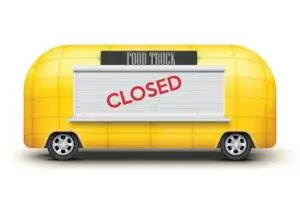
Why do food trucks fail?
Food trucks are not immune to failure. Many factors can contribute to a food truck's failure, such as a lack of customers, high overhead costs, and competition from other food trucks and restaurants.
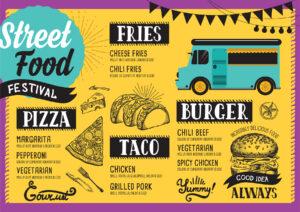
What are the most popular food truck menu concepts?
Home What are the most popular food truck menu concepts? Maybe you're thinking of opening a food truck or wanting to hire a food truck

How Much Does It Cost To Rent A Food Truck?
Answering the question of “how much doe's it cost to rent a food truck” can be difficult as every country, province or state can be different.
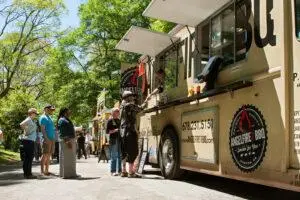
Have a food truck attend your event
Home HAVE A FOOD TRUCK ATTEND YOUR EVENT We are going to go over some of the things for you to think about when you
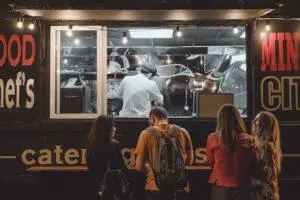
Food Truck Catering
Home FOOD TRUCK CATERING THINGS YOU SHOULD KNOWLooking to hire a food truck to provide catering for your event? Below we will talk about the
